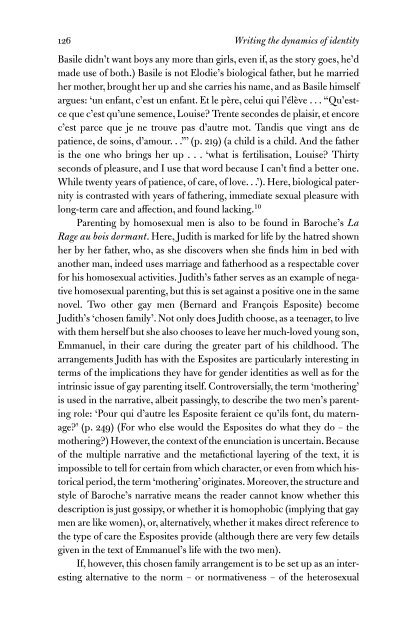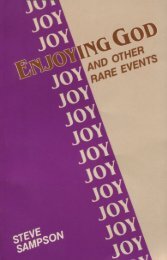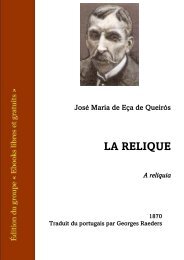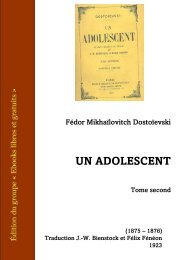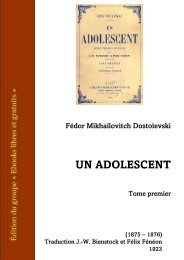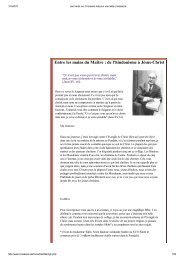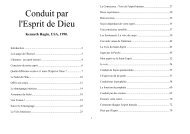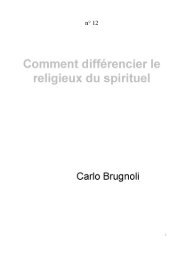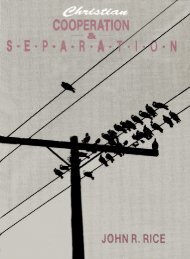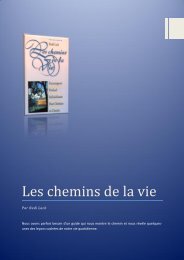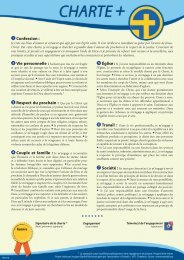Women writing in contemporary France
Create successful ePaper yourself
Turn your PDF publications into a flip-book with our unique Google optimized e-Paper software.
126 Writ<strong>in</strong>g the dynamics of identity<br />
Basile didn’t want boys any more than girls, even if, as the story goes, he’d<br />
made use of both.) Basile is not Elodie’s biological father, but he married<br />
her mother, brought her up and she carries his name, and as Basile himself<br />
argues: ‘un enfant, c’est un enfant. Et le père, celui qui l’élève . . . “Qu’estce<br />
que c’est qu’une semence, Louise? Trente secondes de plaisir, et encore<br />
c’est parce que je ne trouve pas d’autre mot. Tandis que v<strong>in</strong>gt ans de<br />
patience, de so<strong>in</strong>s, d’amour. . .”’ (p. 219) (a child is a child. And the father<br />
is the one who br<strong>in</strong>gs her up . . . ‘what is fertilisation, Louise? Thirty<br />
seconds of pleasure, and I use that word because I can’t f<strong>in</strong>d a better one.<br />
While twenty years of patience, of care, of love. . .’). Here, biological paternity<br />
is contrasted with years of father<strong>in</strong>g, immediate sexual pleasure with<br />
long-term care and affection, and found lack<strong>in</strong>g. 10<br />
Parent<strong>in</strong>g by homosexual men is also to be found <strong>in</strong> Baroche’s La<br />
Rage au bois dormant. Here, Judith is marked for life by the hatred shown<br />
her by her father, who, as she discovers when she f<strong>in</strong>ds him <strong>in</strong> bed with<br />
another man, <strong>in</strong>deed uses marriage and fatherhood as a respectable cover<br />
for his homosexual activities. Judith’s father serves as an example of negative<br />
homosexual parent<strong>in</strong>g, but this is set aga<strong>in</strong>st a positive one <strong>in</strong> the same<br />
novel. Two other gay men (Bernard and François Esposite) become<br />
Judith’s ‘chosen family’. Not only does Judith choose, as a teenager, to live<br />
with them herself but she also chooses to leave her much-loved young son,<br />
Emmanuel, <strong>in</strong> their care dur<strong>in</strong>g the greater part of his childhood. The<br />
arrangements Judith has with the Esposites are particularly <strong>in</strong>terest<strong>in</strong>g <strong>in</strong><br />
terms of the implications they have for gender identities as well as for the<br />
<strong>in</strong>tr<strong>in</strong>sic issue of gay parent<strong>in</strong>g itself. Controversially, the term ‘mother<strong>in</strong>g’<br />
is used <strong>in</strong> the narrative, albeit pass<strong>in</strong>gly, to describe the two men’s parent<strong>in</strong>g<br />
role: ‘Pour qui d’autre les Esposite feraient ce qu’ils font, du maternage?’<br />
(p. 249) (For who else would the Esposites do what they do – the<br />
mother<strong>in</strong>g?) However, the context of the enunciation is uncerta<strong>in</strong>. Because<br />
of the multiple narrative and the metafictional layer<strong>in</strong>g of the text, it is<br />
impossible to tell for certa<strong>in</strong> from which character, or even from which historical<br />
period, the term ‘mother<strong>in</strong>g’ orig<strong>in</strong>ates. Moreover, the structure and<br />
style of Baroche’s narrative means the reader cannot know whether this<br />
description is just gossipy, or whether it is homophobic (imply<strong>in</strong>g that gay<br />
men are like women), or, alternatively, whether it makes direct reference to<br />
the type of care the Esposites provide (although there are very few details<br />
given <strong>in</strong> the text of Emmanuel’s life with the two men).<br />
If, however, this chosen family arrangement is to be set up as an <strong>in</strong>terest<strong>in</strong>g<br />
alternative to the norm – or normativeness – of the heterosexual


